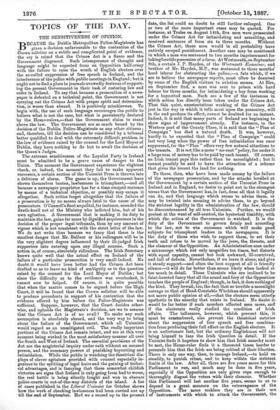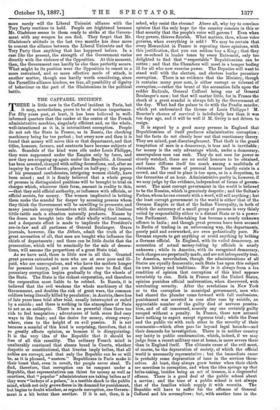TOPICS OF THE DAY.
THE SENSITIVENESS OF OPINION.
11DECAUSE the Dublin Metropolitan Police-Magistrate has .113 given a decision unfavourable to the contention of the Crown solicitor on a subtle and complicated point of evidence, the cry is raised that the Crimes Act is a fiasco and the Government disgraced. Such intemperance of thought and language might be expected from an Opposition half-crazy with the failure to raise the wrath of English electors over the so-called suppression of free speech in Ireland, and the interference of the police with public meetings in England ; but it ought not to find a place in journals avowedly desirous of support- ing the present Government in their task of restoring law and order in Ireland. To say that because a prosecution of a news- paper is defeated on a technical point, the Government is not carrying out the Crimes Act with proper spirit and determina- tion, is worse than absurd. It is positively mischievous. To begin with, the use of such language encourages the public to believe what is not the ease, but what is persistently declared by the Home-rulers,—that the Government claim to stand above the law. The Government are as much bound by the decision of the Dublin Police-Magistrate as any other citizens ; and, therefore, till the decision can be considered by a tribunal better qualified to deal with the extremely difficult problem in the law of evidence raised by the counsel for the Lord Mayor of Dublin, they have nothing to do but to await the decision of the Queen's Judges.
The extreme sensitiveness of the Loyalist Party in Ireland must be admitted to be a grave cause of danger to the Union. The moment the Government experience the slightest check, or, indeed, the moment they fail to make apparent successes, a certain section of the Unionist Press is thrown into a delirium of alarm. The game is up, the Government have shown themselves beaten, lawlessness is triumphant,—and all because a newspaper proprietor has for a time escaped sentence by means of a technical objection, or possibly may escape it altogether. Such critics forget altogether that the failure of a prosecution is by no means always fatal to the cause of the prosecutors. O'Connell's final acquittal, for instance, sounded the death-knell not of the Ministry who indicted him, but of his own agitation. A Government that is making it its duty to maintain the law, gains far more by dignified acquiescence in the decision of the proper legal tribunals, than by any amount of vigour which is not consistent with the strict letter of the law. We do not write thus because we fancy that there is the smallest danger that Mr. Balfour or his colleagues will be in the very slightest degree influenced by their ill-judged Irish supporters into entering upon any illegal courses. Such a notion is, of course, absolutely ridiculous. The Irish Secretary knows quite well that the actual effect on Ireland of the failure of a particular prosecution is very small indeed. No doubt it would have been better had the Crimes Act been drafted so as to leave no kind of ambiguity as to the question raised by the counsel for the Lord Mayor of Dublin ; but since the difficulty as to the evidence was overlooked, it cannot now be helped. Of course, it is quite possible that when the matter comes to be argued before the High Court, it will be found that the Crown solicitor will be able to produce precedents in support of his contention that the evidence offered by him before the Police-Magistrate was sufficient. Suppose, however, that the Court decides other- wise, and upholds the Magistrate's decision, are we to assume that the Crimes Act is of no avail? To make any such assumption is absolutely absurd, and the very way to bring about the failure of the Government, which all Unionists would regard as an unmitigated evil. The really important portions of the Crimes Act remain intact, and are at this very moment being worked in the most satisfactory manner all over the South and West of Ireland. The essential provisions of the Act are the magisterial inquiry under oath without an accused person, and the summary powers of punishing boycotting and intimidation. While the public is watching the theatrical dis- plays of clever agitators provided with counsel especially in- genious in the 'splitting of legal hairs and the gaining of techni- cal advantages, and is fancying that these somewhat childish victories are signs that Ireland is only going from bad to worse, the real battle is being silently fought and won in obscure police-courts in out-of-the-way districts of the island. A list of eases published in the Liberal Unionist for October shows how the work of checking lawlessness had been carried out up till the end of September. Had we a record up to the present
date, the list could no doubt be still further enlarged. One or two of the more important cases may be quoted. For instance, at Tralee on August 14th, five men were prosecuted under the Crimes Act for intimidating and assaulting, and received sentences of from six to three months. Without the Crimes Act, these men would in all probability have entirely escaped punishment. Another case may be mentioned in which a man was sentenced to two months imprisonment for taking forcible possession of a farm. At Westmeath, on September 8th, a certain J. P. Hayden, of the Westmeath Examiner, and brother of Mr. Hayden, M.P., was sentenced to three months' hard labour for obstructing the police,—a fate which, if we are to believe the newspaper reports, must often be deserved by some of the English visitors to eviction scenes. At Bin, on September 2nd, a man was sent to prison with hard labour for three months, for intimidating a boy from working for a boycotted man. Such are a few of the instances in which action has directly been taken under the Crimes Act.. That this quiet, unostentatious working of the Crimes Act just in the way in which it tells most upon the peasantry, will, in the end produce its effect, cannot be doubted for an instant. Indeed, it is said that many parts of Ireland are beginning to show signs of improvement already. For instance, in the- Western part of the County Clare, it is said that the "Plan of Campaign" has died a natural death. It was, however, hardly to be expected that the "Plan of Campaign' could last very long when the power of free intimidation was once suppressed, for the "Plan" offers very few natural attactions to the tenants. It is not like a mere "no-rent "policy, for under it a large sum of money has to be paid by each tenant. Of course,. an Irish tenant pays this rather than be moonlighted; but it cannot possibly be said to have the attraction of a scheme that gives the tenant the land for nothing.
To those, then, who have been made uneasy by the failure of the newspaper prosecution, and by the attacks levelled at the Government by a certain section of the Unionist Press in Ireland and in England, we desire to point out in the strongest terms that the Government has, in fact, done all that it legally can do, and that language which seems to advise them, or may be twisted into seeming to advise them, to go beyond the strictest legality in the administration of the law, should be discountenanced by all true Unionists. Further, we would protest at the want of self-control, the hysterical timidity, with which the action of the Government is watched. It is the dirty of the Government to govern firmly and according to the law, not to win successes which will make good subjects for triumphant leaders in the newspapers. It is the duty of those who wish to support them, to set their teeth and refuse to be moved by the jeers, the threats, and the clamour of the Opposition. An Administration seen under a microscope which not only magnifies ten times, but distorts with equal capacity, cannot but look awkward, ill-contrived, and full of defects. Nevertheless, if we leave it alone, and give it steady support—and often the best support of all is friendly silence—it will do far better than seems likely when looked at- too much in detail. Those Unionists who are inclined to be faint-hearted fancy that all the sound and fury of the Opposition touches the people of England; though, in fact, it does nothing of the kind. They bewail, too, the fact that so terrible a moonlight outrage as that of Head-Constable Whelehan should apparently not move public opinion at all,—that the electors seem utterly apathetic to the anarchy that exists in Ireland. No doubt it would be far better if such murders affected men more, and if the electorate really studied the condition of Irish affairs. The influences, however, which prevent this, it must be remembered, also prevent the theatrical outcries about the suppression of free speech and free combina- tion from producing their full effect on the English electors. It is an unfortunate fact, but the ordinary Englishman will not bring himself to face the Irish Question in detail. If the Unionist finds it hopeless to show him that Irish anarchy must be met, the Home-ruler finds it a thousand times harder to persuade him that the Irish are being robbed of their liberties. There is only one way, then, to manage Ireland,—to hold on steadily, to punish crime, and to keep within the strictest limits of the law. After all, there are five years more for this Parliament to run, and much may be done in five years, especially if the Opposition are only given rope enough to thoroughly disgust the voters with their clamour. Whether this Parliament will last another five years, seems to us to- depend in a great measure on the extravagance of the Opposition. The more reckless they are in their use of instruments with which to attack the Government, the
more surely will the Liberal Unionist alliance with the Tory Party continue to hold. People are frightened because Mr. Gladstone seems to them ready to strike at the Govern- ment with any weapon he can find. They forget that Mr. Gladstone'a attitude in the last two months has done more to cement the alliance between the Liberal Unionists and the Tory Party than anything that has happened before. In a case like the present, the strength of the Government varies directly with the violence of the Opposition. At this moment, then, the Government can hardly be else than perfectly secure. What might be its position were the Opposition to resort to a more restrained, and so more effective mode of attack, is another matter, though one hardly worth considering, since the Parnellite alliance hinders, we fear, all possibility of dignity of behaviour on the part of the Gladstonians in the political battle.



































 Previous page
Previous page